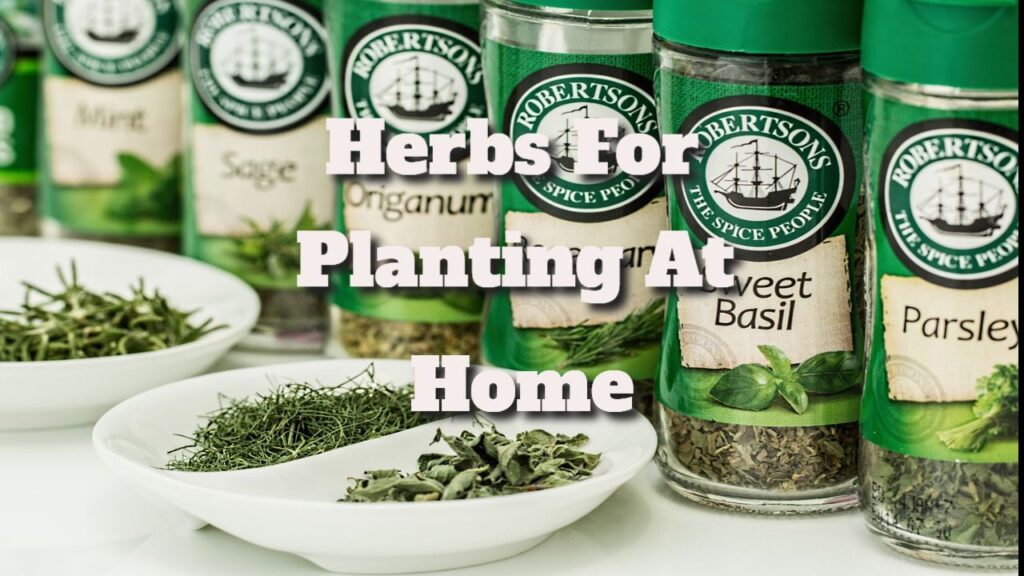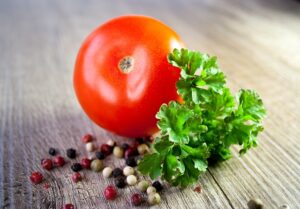Herbs That Are Good for You to Plant at Home
Herbs That Are Good for You to Plant at Home: Establishing a little perfumed kitchen garden is possible. All you need to do is cultivate some healthy herbs. Do you not have enough space to garden? Herbs can also be planted on a windowsill in small pots.
Growing herbs can be a productive and enjoyable hobby. They can be used in cooking, aromatherapy, and as a natural room freshener.
Discover the therapeutic properties of these aromatic plants that you can quickly grow at home.
Healthy herbs that you incorporate into your meals and around your home can help your body deal with one of today’s most pressing issues: the impact of stress.
How herbs can help you relax
Pesticide-laced foods enter our bodies, causing toxic overload. You’ve had a bad day, a disagreement with a loved one, or financial problems. All of these factors may cause stress in your body.
Your body’s NeuroEndoMetabolic (NEM) stress response system deals with stress via six organ and system circuits.
A pair of walnut-shaped adrenal glands above the kidneys are also part of the stress response system.
When faced with a stressful situation, the NEM signals the adrenal glands to release the anti-stress hormone cortisol.
However, more cortisol is necessary to control the situation if the stress is prolonged.
This can overload your adrenal glands, causing them to produce insufficient cortisol. As a result, your body’s ability to cope with stress weakens, perhaps leading to adrenal exhaustion.
Suppose you regularly experience acute exhaustion accompanied by symptoms such as anxiety, sleeplessness, lack of energy, difficulty waking up, constipation, poor concentration, stubborn weight gain, cravings for salty and fatty foods, and brain fog. In that case, you may have Adrenal Weariness Syndrome (AFS).
Allowing the adrenal glands ample time to heal naturally and adhering to protocols for repairing adrenal fatigue is crucial for recovery from this illness.
Adrenal fatigue repair requires a nutrient-dense diet, progressive body cleansing, and stress reduction.
Homegrown, pesticide-free herbs added to your meals or drinks can help you relax, add nutrients to your diet, and provide a variety of gentle healing effects.
Aromatic herbs provide healing, calming, and therapeutic properties that can aid in the health of your adrenal glands.
Here are several ways that healthy herbs may aid with stress recovery. Beneficial herbs include:
Improve your immunity by naturally cleansing your system.
Improve digestion
Increase nutrient absorption and reduce mood fluctuations
To treat constipation, improve cognition, reduce stress, and increase stamina.
Herbs that are beneficial to plant at home
Herbs grown at home highly contain vitamins, antioxidants, minerals, essential oils, fibre, and anti-inflammatory and antibacterial components. They can also be used as an insect repellent and a detoxifier.
Some beneficial herbs that you can grow at home include:
Parsley
The inclusion of parsley in recipes improves them. This delectable plant is high in vitamins A, C, and K, as well as iron, calcium, and folic acid. One spoonful of parsley supplies enough vitamin K to meet your daily needs.
Parsley is easy to grow at home because it requires minimal sunlight and effort.
Basil
This adaptable, beneficial plant has numerous therapeutic properties and may be grown indoors and outdoors. It is high in vitamins A, C, and K and copper, manganese, and flavonoids.
Basil is a herb used to reduce inflammation, detoxify the body, and remove skin blemishes.
It calms nerves, boosts the immune system, promotes cardiovascular health, combats depression, and improves digestive health. Basil can also help detoxify the liver, which can help relieve adrenal fatigue.
Add basil to casseroles, soups, and broths. Basil can also be used as a natural insect repellent.
Lavender
Lavender, a gorgeous and scented flower, thrives in sunny, well-drained regions. Because of its relaxing perfume and stimulating and calming qualities, lavender is commonly used in aromatherapy.
Lavender oil has been demonstrated to promote hair growth. According to clinical trials, a combination of lavender and other essential oils may help with alopecia areata.
The herb is also utilised in cosmetics like shampoos and hand soaps.
Lavender essential oil aids in germ elimination, increase circulation, relieves joint pain, accelerates wound healing, and relieves respiratory difficulties.
Rosemary
People have used rosemary for healing, disease prevention, and cooking for thousands of years. Massaged onto the skin, a blend of rosemary and lavender essential oils is thought to have a soothing effect on the brain, alleviating stress and fatigue.
According to studies, rosemary can aid in treating neurological disorders, cancer, and diabetes. Rosemary contains potent medicinal compounds that promote healing and increase life expectancy.
This aromatic, nutrient-dense herb grows best when watered frequently and in full sunlight. Rosemary complements grilled vegetables.
Thyme
Thyme has strong medicinal properties and enhances general well-being. Its antimicrobial characteristics help to cure sore throats.
This plant is also known for lowering cholesterol and blood pressure, fighting cancer, treating bronchitis, and preventing food poisoning.
Studies have demonstrated Thyme improves mood by boosting the production of neurotransmitters like serotonin and dopamine.
Thyme goes well with almost any cuisine, including salad and soup. The plant is easy to grow indoors because of its small size.
Mint
Mint is one of the most straightforward herbs to cultivate at home. This aromatic, refreshing herb grows quickly and well and is frequently used in cuisines worldwide.
You can meet your daily vitamin A requirements with just two teaspoons of mint.
The herb assists digestion improves brain function, improves oral health, and soothes cold symptoms. Make an excellent mint tea or sprinkle the herb on rice dishes, salads, and soups to add flavour.
Dill
Dill has been utilised in food and medicine for centuries. The herb contains vitamins A and C, fibre, folic acid, and manganese.
It has antidepressant and bactericidal properties. Dill includes fatty acids that assist digestion and boost energy levels.
In research, dill has been demonstrated to alleviate menstrual cramps, prevent epilepsy, and protect against free radical damage.
Dill can be used in almost any dish. The herb can be grown both indoors and outdoors.
Chives
This aromatic, evergreen and nutritious herb with a slight onion-garlic flavour compliment savoury dishes such as roasted potatoes and green salads.
Chives contain fibre, antioxidants, phytochemicals, calcium, magnesium, zinc, riboflavin, and phosphorus, all of which are good for your health.
Chives’ health benefits include better digestion, antioxidant protection, lower blood pressure, and protection against certain cancers. These herbs are simple to grow indoors.
Cilantro
This popular nutritious herb goes well with almost any dish. It contains A, E, K, and C vitamins and iron, folate, potassium, magnesium, and calcium. According to studies, cilantro can help the body eliminate heavy metals.
The herb contains antioxidants, contributing to the battle against free radical damage.
The natural relaxing benefits of cilantro aid in calming the brain, reducing anxiety, and enhancing sleep, which may be beneficial for adrenal exhaustion.
The plant also improves heart health, decreases blood sugar, and prevents urinary tract infections.
Sage
Sage has been used millennia to manufacture ancient remedies for pain, swelling, diarrhoea, indigestion, and menstrual cramps. Sage in the diet helps with dementia, cholesterol balance, obesity, and diabetes.
Grilled foods and salad dressings benefit from the herb. It is also used to naturally alleviate tiredness and anxiety. Sage prefers well-drained soil and direct sunlight.
Conclusion
Homegrown herbs are high in nutrients, antioxidants, essential oils, and therapeutic properties.
Some of the best beneficial herbs you can grow at home are parsley, basil, lavender, rosemary, Thyme, mint, dill, chives, cilantro, and sage.
Herbs contain natural essential oils, vitamins, minerals, and antioxidants that aid digestion, detoxification, and restoration of adrenal health.
Reduce stress weariness, improve oral health, reduce inflammation, erase skin blemishes, and boost memory.
On the other hand, patients suffering from adrenal fatigue may be responsive to herbs.
As a result, speaking with an experienced physician or nutritionist to determine whether these herbs are appropriate for you is critical.
The post Herbs That Are Good for You to Plant at Home appeared first on https://gqcentral.co.uk


Comments are closed